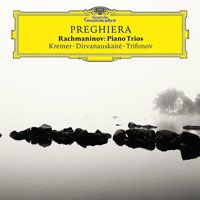by the Grigoryan Brothers
If you say the words ‘Grigoryan brothers’ to most classical music fans, they’ll smile and nod knowingly. Renowned for their musicianship since they were teenagers, they’ve released five albums together: pretty much all of them have been nominated for awards. They’re played all the time on ABC Classic FM, and in people’s homes around the world. Slava Grigoryan’s most recent album featured beautiful arrangements of the Bach Cello Suites that I still listen to, these many months later.
On the brothers’ latest collaboration they pay homage to their first teacher, mentor and father, Edward Grigoryan, by performing his arrangements of their favourite works. Edward Grigoryan was the one who started his sons’ love of all things guitar and has helped guide both brothers on their superstar path.
Keeping in mind each brother’s style, you can tell these arrangements were lovingly crafted for each specific performer. Gentle and delightful, this collection of famous works is the perfect wind-down music. With names like ‘Morning Song’, ‘Night Song’, ‘Sad Song’ and ‘After a Dream’, and composers like Tchaikovsky, Elgar, Falla and Faure, you get the sense that this album will be delightful – and exactly what you need at the close of a long day of modern hectic life.
– Kate Rockstrom
Preghiera, Rachmaninov: Piano Trios by Gidon Kremer, Daniil Trifonov, Giedrė Dirvanauskaitė
Twenty-year-old Sergei Rachmaninov was shocked to hear of the death of his friend and mentor Tchaikovsky. He immediately set about composing ‘Trio Elegiaque No. 2’, dedicated ‘to the memory of a great artist’. Tchaikovsky himself did the same six years earlier, dedicating his own piano trio to the memory of Nikolai Rubenstein. Friendship, memory and dedication are, therefore, three overarching themes of ‘Trio Elegiaque No. 2’. It is fitting that Gidon Kremer chose to record this – along with two other Rachmaninov trios – for his seventieth birthday celebration, early this year. He is joined by friends Daniil Trifonov (piano) – the young pianist of the hour – and Giedre Dirvanauskaite (cello), with whom he established Kremerata Baltica 20 years ago. Even though generations separate pianist from cellist and violinist, the three share a remarkable rapport.
The opening, ‘Preghiera’ – taken from Rachmaninov’s ‘Piano Concerto No. 2’, and arranged for piano trio by Fritz Kreisler – is, for me, the highlight. Here, violinist, cellist and pianist show off their individual virtuosity, and as well as their exquisite musical compatibility. Overall, and particularly in ‘Trio Elegiaque No. 2’, Kremer, Dirvanauskaite and Trifonov give a luscious and romantic performance. A great tribute to Kremer and his musical friendships.
– Alexandra Mathew
Mahler: Das Lied Von Der Erde by Jonas Kaufmann, Wiener Philharmoniker & Jonathan Nott
When Gustav Mahler composed Das Lied von der Erde ('The Song of the Earth’), he envisaged two singers – a tenor and an alto – performing the cycle. In the absence of an alto, Mahler specified that the second voice be baritone. Regardless of the combination, Das Lied has always been associated with low-voiced singers. Famous recordings of the work include those by Dietrich Fischer-Dieskau, Christa Ludwig and Kathleen Ferrier. German tenor Jonas Kaufmann’s new recording of Das Lied is, therefore, an unusual addition to the mix.
Not everyone is so impressed by Kaufmann’s Mahler. It’s not solo tenor repertoire, they say. He croons too much. They say he struggles. However, my impression of Kaufmann’s performance, recorded live with the Vienna Philharmonic under Jonathan Nott, is almost entirely positive (please note, I am not a Mahler specialist, just a Kaufmann fan). Granted, his Von der Jugend (‘Youth’) sounds at times strained, as though his larynx is creeping its way up to an uncomfortably high position, but I found his Der Abschied (‘The Farewell’) beautiful and moving. Kaufmann’s almost baritonal tenor lifts the poetry off the score. His enunciation of the German is absolutely delectable. Take, for example, the line Die liebe Erde allüberall blüht auf im Lenz und grunt (The dear earth everywhere blossoms up in spring and greens). His E emerges from the orchestra with a violinistic quality, and the ‘l’ of liebe launches his voice as it blooms and soars over Mahler’s pastoral orchestration, settling eventually on the final Ewig (Forever). It’s magical.
As is to be expected, the Vienna Philharmonic gives a spine-tinglingly good performance. Bright woodwinds sparkle during the lighter moments, and the strings and horns signal something more ominous during the more pensive passages. Kaufmann’s performance is imperfect, rich and impassioned, conducted assuredly by Nott.
– Alexandra Mathew





